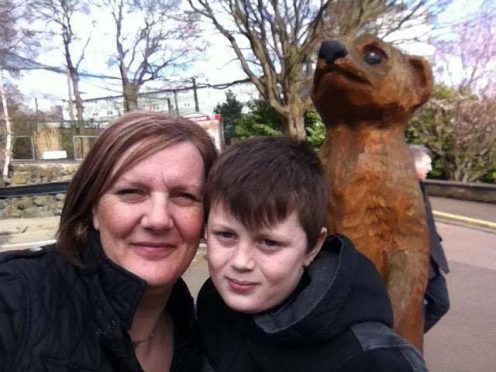A seven-year-old autistic boy from Inverness was handcuffed by police after he had an outburst in his bedroom.
Police officers were called to the home in Hilton by a carer who was looking after Daniel Gourlay.
He suffers from a type of autism called pathological demand avoidance (PDA), which means he is unable to cope with small changes to his routine.
Mother Barbara Irvine said she was left in disbelief at the way the situation was handled.
However, she said she has since been assured by police that a note will be placed on the system advising officers of how to respond to Daniel.
The 45-year-old nurse has also called for an earlier diagnosis of the condition, and said her son was only diagnosed in Glasgow in April despite her telling local health professionals for three years that he was exhibiting signs of PDA.
The incident happened in May last year, almost a year before Daniel was given his final diagnosis.
Miss Irvine said that a carer who was at the home at the time called the police after her son went into a ‘meltdown’ and trashed his bedroom because he did not want to go horse riding.
She said: “The male officer came in and I tried to speak to him at the door and he totally ignored me and went upstairs and I got told to stay downstairs.
“But I went up and saw him. I was very upset and I walked in and said, ‘really?’ The officer said, ‘he was kicking, biting and hitting’, and I told him this was typical and asked him to take the handcuffs off.
“Daniel was calm and was crying but he was not struggling. The police officer was trying to speak to him but I kept saying that he is possibly autistic and that he will just get more volatile.
“The officer should have spoken to me first, but instead he went steaming up the stairs.”
Jenny Paterson, director of The National Autistic Society Scotland, said: “It’s very troubling to hear about this. It must have been extremely distressing for the child and his family.”
Mrs Paterson stressed that autistic behaviour can be “easily misinterpreted” and that if autistic children become highly anxious or overwhelmed, they can easily lose control.
She added: “This is why it’s so vital that the police and other criminal justice personnel have autism training, so they understand the additional communication challenges faced by autistic people and how to prevent escalation.”
A police spokeswoman said: “Police attended at the request of a partner agency and the matter was resolved appropriately.”
An NHS Highland spokesman said: “We appreciate the family has concerns and would invite them to contact our child health commissioner to arrange a meeting.”
